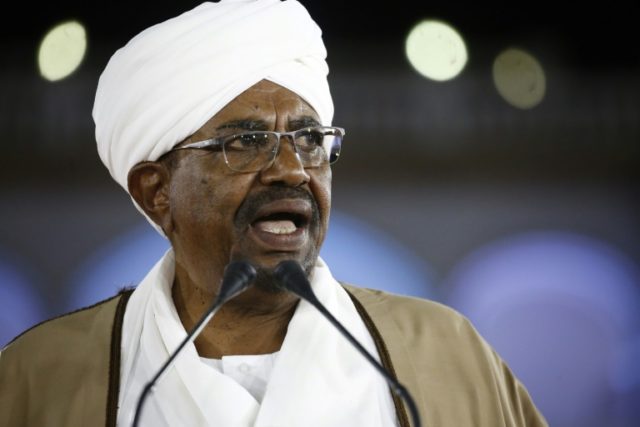After months of increasingly large protests demanding an end to his three bloody decades of rule, the miitary deposed Sudanese President Omar al-Bashir on Thursday and placed under arrest. Revelers filled the streets in response to the news, but demonstrators said they will not relax until a civilian government takes over.
Defense Minister Awad Ibn Auf appeared on state television to announce the arrest of Bashir, 75, in power since 1989.
“I announce as minister of defense the toppling of the regime and detaining its chief in a secure place,” Ibn Auf said, justifying the action by invoking the “poor management, corruption, and absence of justice” under Bashir.
“The armed forces will take power with representation of the people to pave the way for Sudanese people to live in dignity,” he said.
Ibn Auf declared a three-month state of emergency, to be followed by a two-year “transitional period” leading up to elections for a civilian government. The main opposition group, the Sudanese Professionals’ Association (SPA), immediately announced it will only accept a civilian transitional government staffed by opposition leaders.
“We are not leaving. We urge the revolutionaries not to leave the sit-in,” the SPA said on Thursday as celebrations erupted in the streets. Within hours of Bashir’s ouster, a group of female protesters was marching through the streets demanding the fall of Auf’s government.
Another statement from protest organizers demanded a “four-year transition period where technocrats take over the country to ready it for democracy,” supported by “an army that will protect us rather than rule over us.”
Sudan’s military intelligence agency announced it would free all political prisoners taken during Bashir’s rule, possibly to make room for the hundred or so executives of Bashir’s National Congress Party it arrested on Wednesday, including the former vice president and the head of the party.
Bashir himself is said to be under house arrest, his estate surrounded by military forces. An opposition source said on Thursday that “a number of leaders of the terrorist Muslim Brotherhood group” were being held along with Bashir, who ruled as an Islamist dictator. The military has also reportedly taken over state media and curtailed operations at the Khartoum airport.
Critics of the junta quickly noted that some of its leaders, including Ibn Auf, are themselves accused of crimes against humanity and have been targeted with sanctions. The U.S. Treasury Department sanctioned Ibn Auf in 2007 for “fomenting violence and human rights abuses in Darfur.”
Bashir is the subject of an arrest warrant from the International Criminal Court for crimes against humanity. As of Thursday morning, the junta has not indicated whether it will extradite him to stand trial at the ICC. Protesters interviewed by various international media organizations expressed apprehension that Bashir will be quietly allowed to slip away into exile.
The U.S. embassy in Khartoum issued a statement on Thursday warning conditions in Sudan are still dangerous despite the “festive” atmosphere following Bashir’s ouster. The United Nations called on the military junta to lift the state of emergency and allow citizens to practice their rights to peaceful assembly and expression.
The U.S. State Department issued a “shelter in place” warning for U.S. citizens in Sudan on Thursday morning, advising them to avoid crowds and areas where demonstrations are taking place.
Coups are not a new experience for Sudan, which has experienced five of them since gaining independence from the United Kingdom and Egypt in 1956. The previous coup in 1989 brought Bashir to power as the head of a military junta and an Islamist political party. All of the names floated on Thursday as likely near-term successors are defense officials or military officers.

COMMENTS
Please let us know if you're having issues with commenting.